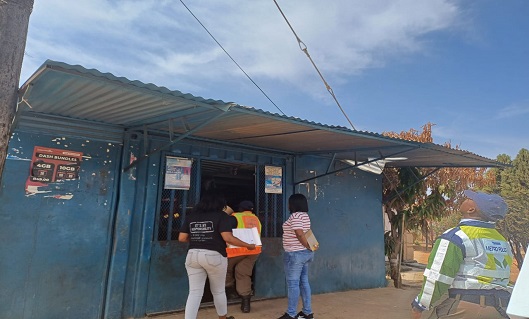
Lerato Mailoane
The Gauteng government said it is satisfied with the progress made in registering informal businesses and has also encouraged those who still need to register to adhere to the 21-day deadline.
This follows President Cyril Ramaphosa’s directive that all spaza shops and food-handling facilities must register with their respective municipalities within 21 days.
The president’s proclamation is a response to the recurring instances of food-borne illnesses which have claimed the lives of children in the country.
The president outlined three critical interventions that must be implemented immediately, including removing hazardous pesticides from the street, protecting children from exposure to these substances, and preventing future outbreaks.
Premier Panyaza Lesufi, speaking at a media briefing on Wednesday, encouraged spaza shop owners to comply with the deadline.
“We want to encourage those still in the queues that let’s meet the deadline set by the president, and it’s only when we reach the deadline that we can determine whether the
deadline is sufficient or an extension is needed.”
This comes amidst concerns raised by informal business owners about the tight timeline.
President Ramaphosa warned that businesses failing to register and meet health standards within the stipulated period will face closure.
To support compliance, the Gauteng Department of Economic Development has launched Qondis’ Ishishini Lakho, a campaign featuring compliance blitzes across the province. These efforts streamline registration and ensure businesses meet legal and health requirements.
The registration process has been simplified to reduce red tape while ensuring compliance.
Business owners must provide personal and business details; a certified and valid copy of a South African identity document; proof of residence; business registration with the CIPC; proof of ownership or permission to utilise business premises; zoning certificate and consent use or special consent use or comment from municipal City Planning; certificate of acceptability or comment from Environmental Health supporting the application; and the municipality-determined payment before a business license may be issued.
In addition, foreign nationals will be required to provide valid documentation from the Department of Home Affairs authorising them to operate a business in South Africa. This documentation must be in the form of a valid business visa or work permit.
Municipalities will intervene by deploying building Inspectors, environmental health officers, local economic development officers, fire inspectors, and town and regional planners.
At the same time, the MEC for Finance and Economic Development, Lebogang Maile, cautioned against South Africans registering businesses on behalf of undocumented foreigners in exchange for money.
“Foreign business owners must also abide by South African laws regarding the employment of workers in their businesses. The law requires that those employed in these shops have work permits, the most common of which is the general work visa.
“This visa is issued to foreigners where it has been proven beyond reasonable doubt that South African citizens and permanent residents with the relevant qualifications, skills, and experience are not available for employment.”
SOURCED FROM THE GPG WEBSITE.

